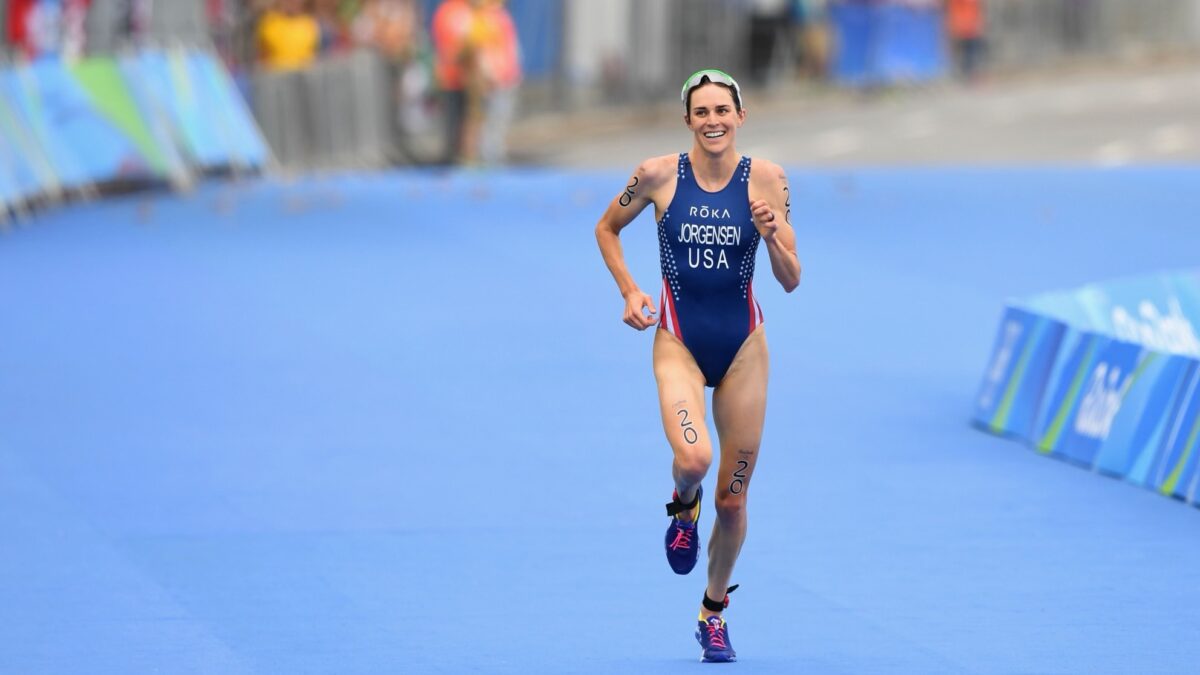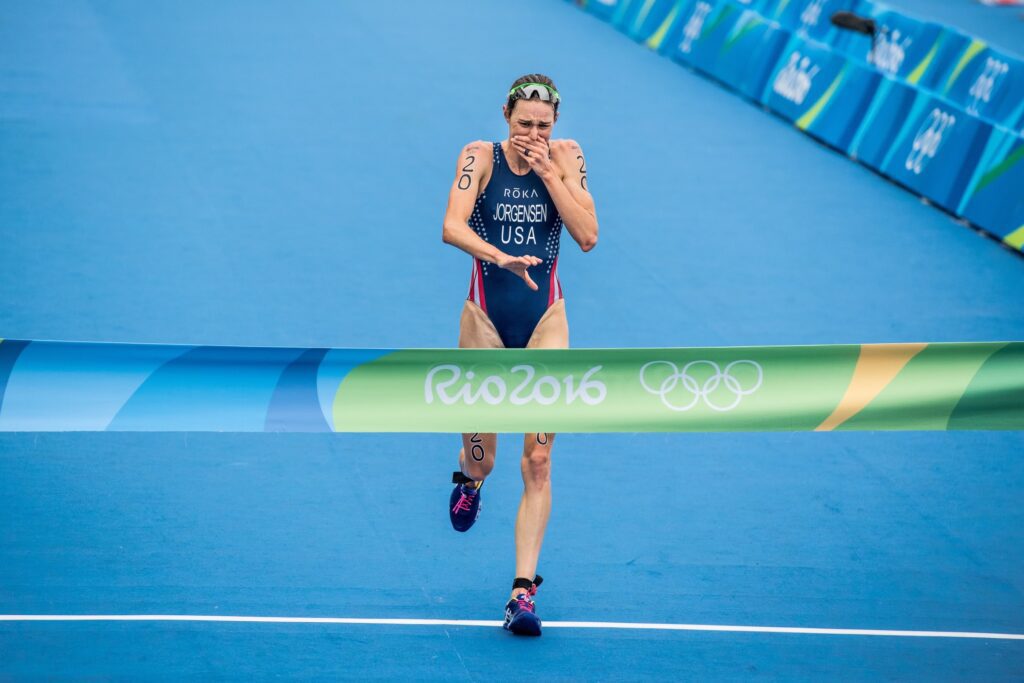Olympic gold medalist Gwen Jorgensen returns to triathlon for run at Paris Games
After birth of second child, American looks to earn second gold medal in Paris
 Photo by:
USA Triathlon
Photo by:
USA Triathlon
American Gwen Jorgensen, the 2016 Olympic champion, is returning to triathlon with her eyes set on helping the United States win gold in the mixed relay at the 2024 Games in Paris, France. After retiring from triathlon to focus on running, Jorgensen’s husband, Patrick Lemieux, encouraged her to think about making the switch back to multisport racing shortly after she announced that she was pregnant with the couple’s second child. George was born in October, a younger brother to Stanley, who was born in August, 2017.
“Patrick knew that I really felt like I missed out not being able to do the mixed relay,” Jorgensen said in an exclusive interview with Triathlon Magazine last weekend. “That’s what’s really motivating me. I feel like I missed out in that relay. Team USA was silver in Tokyo, and I really believe they can be one step higher. This is about more than just me. It’s about motivating my family, and hopefully Team USA.”
While Jorgensen enjoyed some success during her brief running career, including a 15:08 performance in the 5,000 m at the Olympic Trials in 2021, she’s looking forward to a change.
“I feel like running broke my heart,” the 36-year-old said. “I tried to do the marathon multiple times and kept getting injured. The marathon I did do I had a 100 degree fever and I tried to come back again … it just felt like over and over again running kept breaking my heart. I do think I’ll eventually come back to running. I know I have a better marathon in me than I’ve done. I need a little break from it. It’s been hard to put so much time and energy into it and feel like I underperformed on race day.”
Returns to coach Jaimie Turner
Australian coach Jaimie Turner will coach Jorgensen in her comeback to the sport, but she doesn’t plan on joining him in Australia, as she did during her triathlon career.
“I’m going to rejoin my old triathlon coach, Jamie Turner,” she said. “Previously, when I was with him, everything was in a group and in a squad, but now I’m going to have to be more remote and have my own training partners here in Boulder.”
Jorgensen addressed the potential controversial decision of hiring Turner again – he was fired from Triathlon Australia for what media reported as a “major breach of contract” just before a World Triathlon Series event in Japan in 2019.
“Jaimie had some issues and was fired after I left the sport of triathlon, and I’ve been really proud to talk to him and hear about the personal growth that he’s done,” she said. “I’m excited to be on this journey with him again. I think everyone deserves a second chance and I think he’s done a lot of personal growth.”

Short time line
Jorgensen is full aware that there’s a “huge time crunch” in terms of qualifying for the Olympics next year.
“It’s going to be really hard,” she said. “It’s scary, but the challenge of it is what keeps me motivated. I will probably have to start racing before I’m ready.”
Jorgensen will likely aim to compete in some Continental Cup events in March, and knows full well that making it to Paris will be a difficult endeavour.
“I will have to earn my spot back on Team USA and that won’t be an easy feat,” she said. “Even to get on the national triathlon team will be really difficult. The top five US women are the best in the world – Team USA is incredible on the triathlon side.”
“There will be a lot of challenges,” she continued. “Travel with two children. Balancing that will be something that will be ever changing. Once you have kids, you kind of have to go with the flow. We’re going to be learning every time we go to a race. It’s going to be a learning process. That is what is exciting for me – having the challenges and figuring them out.”
Role model
Originally Jorgensen had hoped to be able to just compete in the mixed relay in Paris, Once she realized she would have to do the individual race, too, she gradually became more excited about that component, too.
“In order to qualify I have to do the individual, but, for me, the motivation comes from the relay,” she said. “In my training I’ll focus on the shorter, faster, quick stuff. I want to show that I can be a force to help Team USA in the relay.”
She was reluctant to announce her return to the sport, but Lemieux pointed out that “when your name goes on a start list 34 days out, everyone is going to know anyway.”
“I have a lot of work to do,” she said. “I want to let my performance speak for itself. I want to prove to other moms and encourage them that they can come back to the sport. Having two kids, for me, it’s all about putting your best effort in. I can’t control what anyone else does. I know that I can show up on race day, ready to perform at my ability.”
Jorgensen is encouraged by some of the recent moves made in the sport to help mothers continue to race. (The Professional Triathletes Organisation has long had a maternity policy, while World Triathlon recently added one.) For Jorgensen it’s important to make training and racing easier for both “moms and dads.”
She’s also keen to set a good example for her own children.
“The most important thing for me is for the kids see me follow something I love,” she said. “To try my best and to know that I prepared to the best of my ability to perform at the best of my ability. I want to show Stanley that you can’t control what other people do. Lessons like that. Determination. Perserverance. Things like that. This is not going to be easy. I don’t expect to go to the first race and hit it out of the park. I think him, being able to see me fail, and hopefully come back from that, those are the things I want him to see me experience as I work through this journey.”
Giving herself “permission”
Jorgensen feels that as an athlete you “get more out of yourself when you do something that more than just for you.” She acknowledged that after giving birth to Stanley, she struggled with “mom guilt” at times.
“As a mom, even a female – a lot of times we’re more prone to having guilt about things, and that’s something that I prone to feel,” she said. “I had a hard time giving myself permission to go after goals. With Stanley we had no help – no care giver, no family, so pre-school. This time we’re giving ourselves permission to get help.”
Regardless of whether or not she makes it to the Paris Olympics, Jorgensen will certainly provide a much-needed role model that there’s no reason mothers can’t continue to strive for the top of the podium.
